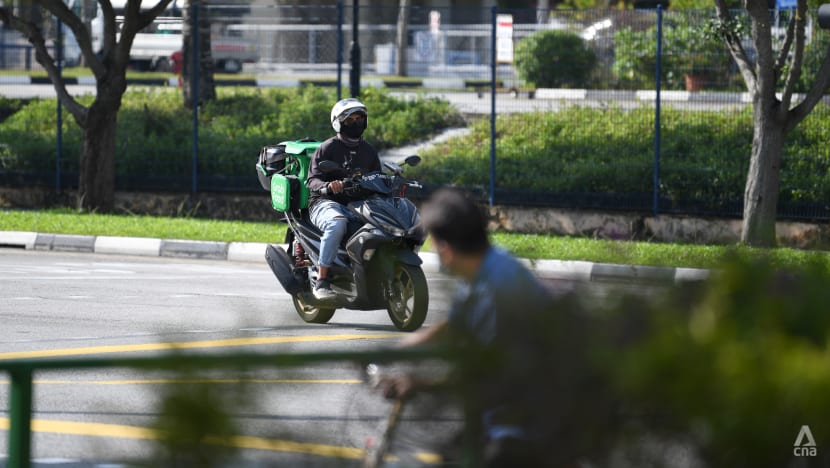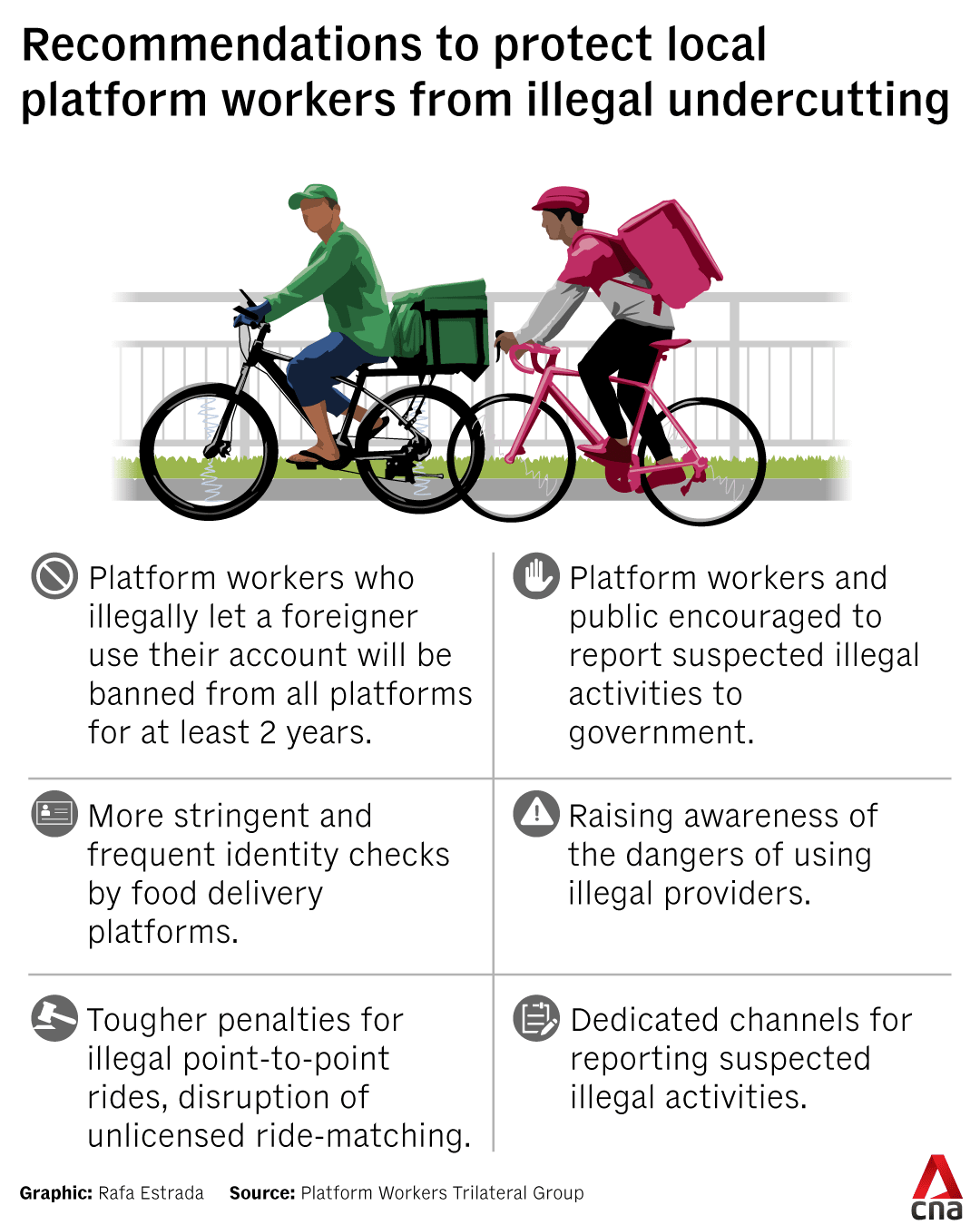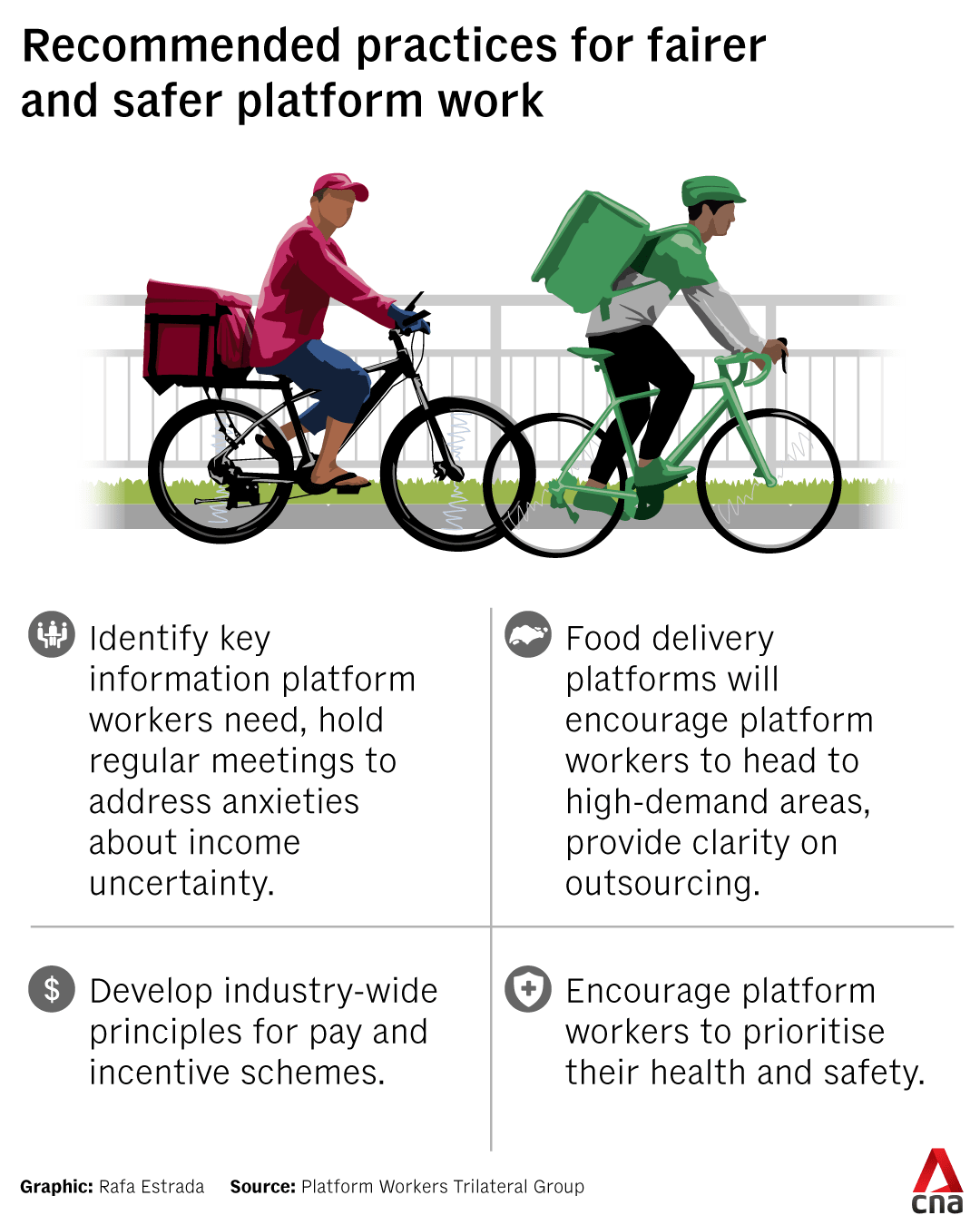'Systematic way' to look into random reports on illegal platform work needed for concerted action: Koh Poh Koon
Individual cases of illegal platform work sometimes "fall through the cracks", said labour chief Ng Chee Meng.

A food delivery rider in Singapore. (File photo: CNA/Calvin Oh)

This audio is generated by an AI tool.
SINGAPORE: While reports on illegal platform work have been made in the past, a systematic and formalised way was needed to collect and address such feedback, the co-chairs of a trilateral group looking into platform worker issues said on Thursday (Sep 11).
"Previously, these kind of reportings were either by workers in a random manner or by members of the public. We didn't have a systematic way to do this," said Senior Minister of State for Manpower and Health Koh Poh Koon.
"Before the Platform Workers Act, there wasn't really a very formalised engagement between the platform workers and the platform operators themselves," he continued.
"There was actually no equal footing for them to undertake any negotiation. There were associations in existence, but they were not given the legal right to actually fully represent the workers who can join them as members."
National Trades Union Congress (NTUC) Secretary-General Ng Chee Meng said that individual cases of illegal platform work sometimes "fall through the cracks".
"When there's collective awareness (and) understanding of the issues and a collective possibility to take action in a fair manner, we can collaborate with the employers – in this case the platform operators – to really seek out win-win possibilities for the business to be able to thrive in Singapore and for the workers to have a fair way to earn a wage.
"In this case, well, it's accumulated over time. And when this was brought up we have taken swift action," he told reporters.
The labour chief then called on platform workers to join the platform work associations so that these groups can collectively represent the workers' interests.
They were responding to CNA's question during a press conference by the trilateral group on why concerted steps to tackle illegal platform work were not taken earlier, given that these issues were not unheard of.
CNA first reported in 2023 about delivery rider accounts being sold online, potentially allowing foreigners to work illegally. Unlicensed carpooling chat groups have been active since at least 2019.
Their comments come after the trilateral group released 10 recommendations to better protect local platform workers. These include measures for stronger detection, prevention and enforcement against illegal platform work.
Among the recommendations, all major platform operators will ban for at least two years any platform worker who has let a foreigner use his or her account to work illegally.
The government will also push for tougher penalties for illegal point-to-point rides and engage online platforms to take down apps, channels and advertisements that facilitate illegal ride-matching.
Dr Koh said the trilateral group's recommendations were a continuation of the work done leading up the Platform Workers Act, which was passed in September 2024 and took effect in January.
Since the Act was passed, the NTUC-affiliated National Delivery Champions Association (NDCA), National Private Hire Vehicles Association and National Taxi Association have gained legal powers to collectively represent platform workers.
These associations have been recognised by at least six platform operators: Grab, ComfortDelGro Zig, Lalamove, GoGoX, Tada and Smile Ride by Trans-Cab.
"Some of these issues that we are trying to tackle were, in fact, already being dealt with in the background," said Dr Koh, pointing to the 50 cases of potential illegal platform activities a year that the Manpower Ministry investigated from January 2023 to mid-2025.
The trilateral group brings together the "formalised platform worker associations and the commitment from the platform operators to actually look at this in a more systematic way", he said.
Dr Koh pointed to platform operators' commitment to notify MOM when they discover or have strong suspicions of illegal account usage, so that the ministry can take "concerted actions" to investigate further.
Platform operators have also agreed to ban offenders from other platforms from opening accounts on their own platforms, thus not allowing loopholes to form, he said.
"Also, we are now able to work more closely, operationally with NDCA, so that there's now a formal mechanism to collect feedback from the workers, creating a dedicated channel for feedback from the public or the workers themselves to be directed to MOM or LTA.
"And then with that, we can plan more targeted enforcement actions when necessary," he added.


DISCUSSIONS ON CROSS-BORDER SERVICES, FAIR EARNNGS
The trilateral group's recommendations were announced at a press conference by Dr Koh, Mr Ng, Senior Minister of State for Transport Sun Xueling and Grab’s group managing director of operations Yee Wee Tang.
On top of the group's recommendations, Ms Sun said that the government is also considering banning those suspected of providing illegal point-to-point services from entering Singapore.
Amid the tougher stance, she acknowledged "latent demand" for legal point-to-point cross-border services and said the government is reviewing improvements to the existing cross-border taxi scheme.
Singapore has some consensus with Malaysian counterparts on passengers' desire to have more boarding and alighting points, and having a more user-friendly app interface for convenience, she said.
But if more vehicles come on board the cross-border taxi scheme, then when they are in Singapore, "we have to be absolutely sure that they are simply providing a legal cross-border taxi service and they're not engaging in illegal (point-to-point) service", she said.
Ms Sun said the government's key priorities in discussions with Malaysia are to better meet consumer demand while safeguarding the interests of Singapore taxi drivers and private hire drivers.
"That is why discussions also involve the installation of the OBU, or the ERP 2.0, to ensure that travel journeys are legitimate."
Another recommendation is for platform operators and platform work associations to develop industry-wide principles related to payment and incentive schemes.
Asked what tangible outcomes can come from this, Dr Koh said that payment structures and incentive schemes differ from platform to platform.
"That's one of the features of the platform space, so that different workers can choose to arbitrage across one platform to another to actually find what suits their needs best," he said.
"And because this is actually dynamic and it's actually different across different platforms, we have to allow flexibility in this engagement."
"We believe that this is why it's best to conduct it bilaterally from a workers association that represents the workers' interests with a particular operator," he said, referring to discussions on pay and incentive schemes.
"If need be, MOM as a neutral third party will step in and facilitate that discussion, so that at some point this will hopefully land on something that strikes a good balance between what the operator needs and what the workers want."
At the press conference, Mr Yee the Grab managing director of operations elaborated on how the platform operator will implement the key principles developed by platform operators and platform work associations for fairer and safer platform work.
He said Grab is looking at potential ways to better explain platform workers' earnings on its app. Grab will also proactively engage the platform work associations on major changes to its incentive schemes.
"Incentive schemes should not encourage overwork," he said. Grab will therefore continue to monitor platform workers' online hours and adjust incentive programmes where necessary.
He elaborated: "Incentives today form a very small part of our partners' earnings. Incentives are used to drive supply to the areas and time of the day when we need the most supply ... so we will continue to use that as and when we need."
Grab will also invest in productivity features to support platform workers to reach their earning goals faster, he said.
WHAT OTHER PLATFORM OPERATORS SAY
On prevention of illegal platform work in food delivery, Mr Yee said that Grab conducts close to 1 million selfie verification checks a month, and investigates around 10 cases for potential account misuse.
Grab will increase the frequency of these checks and notify MOM if there are reasonable suspicions of account misuse, he said.
Other platform operators responded to the recommendations on Thursday.
A Foodpanda spokesperson said the platform has robust measures to prevent the use of foreign-licensed vehicles and continuously enhances platform security against illegal delivery partners.
"Only Singapore citizens and permanent residents can register as delivery partners, with identity verification strictly enforced through facial recognition at the start of each work session throughout the day, and in other situations where identity confirmation is needed."
Attempts to bypass the safeguards are swiftly acted upon through suspension, blacklisting and reporting to MOM.
Addressing recommendations for more scrutiny of outsourced workers, Foodpanda said third-party logistics (3PL) firms handle a "very small proportion of large-format deliveries".
"While 3PLs are accountable for maintaining compliance, Foodpanda is open to strengthening this arrangement," said the spokesperson.
"Our compensation structure is publicly available on the pandarider website, and all updates, including incentives or changes to fees, are clearly communicated across multiple channels," added the spokesperson.
Deliveroo Singapore said all its rider accounts are subject to at least daily real-time facial recognition checks via live videos.
Additional checks may be triggered if rider activity patterns raise flags of possible account-sharing.
There is also "real-time behavioural monitoring" to detect possible account-sharing or fraudulent activity. Accounts will be suspended or terminated if misuse is suspected.
Deliveroo said it will look to further increase the frequency and randomisation of facial recognition checks.


















